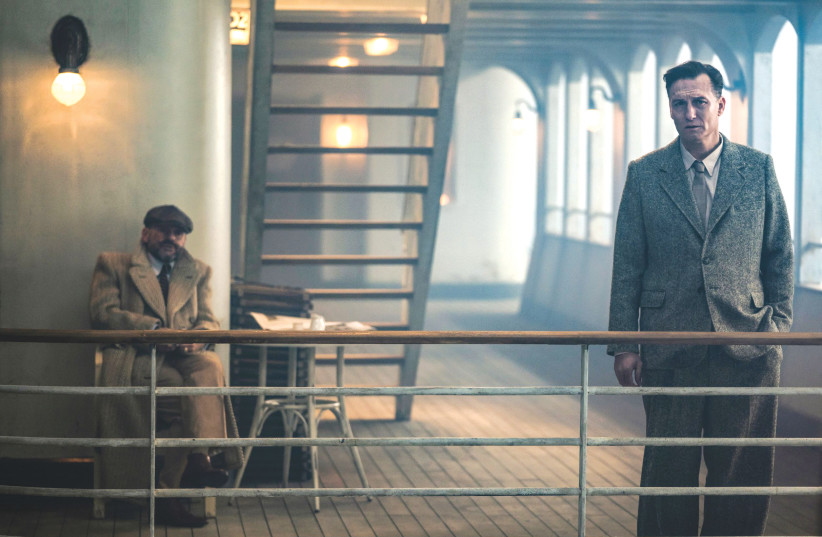Stefan Zweig was an acclaimed Austrian-Jewish author who, after escaping to the US and then moving to Brazil, committed suicide in 1942 in despair over the future. His understandably dark world-view permeates much of his work, especially Chess, his novella that was adapted into Philipp Stolzl’s The Royal Game, which is opening in theaters throughout Israel on April 28.
While there are many movies that depict the horrors perpetrated by the Nazis, it may sound as if The Royal Game would be perhaps less distressing than most movies about the Holocaust, but this is not the case. The movie version of The Royal Game opens in the mid-1940s as an obviously shaken man, Josef Bartok (Oliver Masucci), is sailing from Europe to the US with his wife, Anna (Birgit Minichmayr). But once aboard the ship, he starts to fall apart very fast and it turns out that much of what we think we know about him is not true or not exactly true.
The story flashes back to Vienna 1938, when the Nazis took over Austria. Bartok, a jovial lawyer, has a family business running estates and making investments for businessmen. He goes out to a fancy ball with his wife and minimizes his friends’ and colleagues’ concerns about what will happen now that Austria is under German rule. But before the evening is over, he has been arrested by the Gestapo and taken to a luxury hotel, where he can hear screams of torture from many rooms as he walks down the hall.
The Nazis want information about the assets his company holds so that they can seize them. But, certain that if he keeps the assets’ location secret, he will remain alive, the seemingly mentally strong Bartok resists. While the Nazis do not torture him physically, they keep him in a hotel room in the equivalent of solitary confinement – no human contact except for a silent waiter who delivers his meager meals, no books or newspapers, no music or radio – for years.
Slowly at first and soon more rapidly, he begins to lose his mind. When he is able to grab a book, it turns out to be a chess book and he finds a way to create chess pieces and a board and to play the games in the book, which gives him something to live for. The screams of victims being tortured or murdered do not abate, but he manages to go on. Once the war ends, he seems fragile but eager to build a new life in the new world with his wife.

Only he is no longer really all there. The movie moves back and forth between his days in the hotel and his ocean voyage. Still obsessed with chess, he is goaded into playing the world chess champion, a kind of idiot savant who can barely speak. Bartok is the only player to tie the game and not lose outright. As other passengers bet on him, he agrees to play another match. But as his torment and some difficult truths about his life are revealed, it is clear that this match means little to him. Nothing means anything to him anymore.
Although the film is not particularly long – it runs 110 minutes – the viewer very much gets the feeling of being trapped along with Bartok and it is a harrowing experience. The Royal Game is a difficult film to watch and it provides no easy answers. The film seems to be saying that what is taken from victims by the Nazis can never be returned and there is nothing to be learned by simply surviving. Bartok is not only scarred for life, but he is transformed into a different person, one who can never again feel in control or enjoy his life, no matter what pleasures and rewards come his way.
Masucci, who can also be seen in Fantastic Beasts: The Secrets of Dumbledore and who starred in the creepy Netflix series, Dark, gives an extraordinary performance in the lead role. The character he creates is not conventionally likable and starts off as a big smug and even arrogant, but by the end, he inspires deep compassion. It’s hard not to see yourself in him as he makes you feel the tragedy of the loss of Bartok’s sanity. The Nazis do not need to harm him physically when they can utterly destabilize him from within and Masucci makes this shell of a man utterly convincing.
This movie which was completed in 2021, was the opening-night movie at the Jerusalem Jewish Film Festival last winter, but so far it has not been widely released around the world, due, ironically to the pandemic. Although of course the pandemic lockdowns are in no way comparable to the Nazi torture portrayed in the movie, these lockdowns did cause serious stress for many and this movie may bring back some of the scariest moments of the COVID era. At the very least, the pain we experienced during the lockdowns may make us look even more sympathetically at the flawed and very sad hero of this story.
